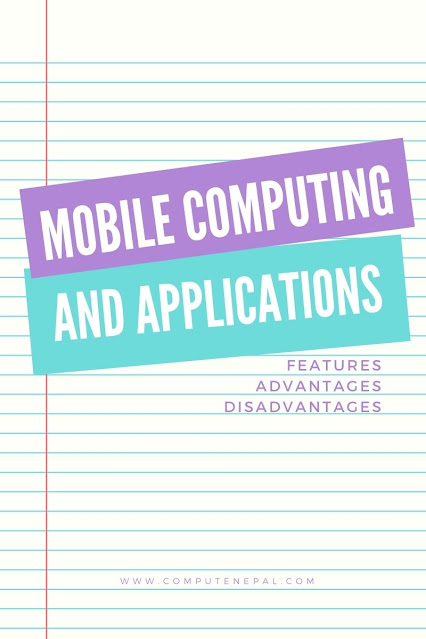Contents
Mobile Computing and its Application
Mobile computing is a generic term describing one’s ability to use technology while moving, as opposed to portable which is only practical for use while deployed in a stationary configuration. A mobile computing device is created using mobile components, such as mobile hardware and software. Mobile computing devices are portable devices capable of operating, executing, providing services and applications like a computing device. It is a computing device used in transit. Users can access data and information from wherever they are.
Many types of mobile computers have been introduced since the 1990s, including a wearable computer, PDA, enterprise digital assistant, smartphone, UMPC (Ultra Mobile PC), Tablet PC.
Features of Mobile Computing devices are:
- Mobile computing is a portable device that can be used during mobility.
- Mobile computing has limited processing and storage capability.
- Mobile computing includes mobile communication, mobile hardware, and mobile software.
- Mobile computing usually contains a touch screen for providing input. It contains an on-screen or virtual keyboard for providing text inputs. However, an external keyboard can be connected by using the USB port, infrared, or Bluetooth.
- Mobile computing contains a camera, speaker, and microphone.
- Mobile computing contains handwriting recognizing software.
- Most mobile computing devices contain a memory card slot to expand the storage capacity.
- Mobile computing has wireless connectivity such as Bluetooth, Wi-Fi to connect to the Internet or with other computing devices as well as a wired connection through the USB port.
- The most mobile computing device can synchronize their data with applications on users’ computers.
- Mobile computing can be used for cloud computing and remote access.
- Mobile computing uses a mobile computing operating system such as Android, iOS, Windows Mobile OS, Palm OS.
- Mobile computing can include GPS (Global Positioning System) receiver for navigation.
Advantages of Mobile Computing
Advantages of mobile technology are:
- Mobile computing enables users to work from any location at any time.
- Mobile computing saves time for accessing data and information.
- Mobile computing helps to increase the productivity of users reducing time and cost.
- Mobile computing has made research easier.
- Mobile computing is one of the major handheld sources of entertainment for users at present.
- Nowadays, Business processes are easily available through secured mobile connections.
- Mobile computing is portable.
- Mobile computing supports cloud computing.
- Mobile computing provides remote access to organizational data from any location.
- Mobile computing is an independent platform. It can be accessed from any hardware or software.
Disadvantages of Mobile Technology
Disadvantages of mobile technology are as follows:
- Mobile technology requires faster and quality services like need either Wi-Fi or GPRS or 3G or 4G connectivity.
- Mobile computing has security concerns, most wireless connectivity is unsafe.
- Large power consumption is due to the use of batteries continuously and mobile computing does not tend to last long.
- The danger of misrepresentation i.e. credential verification is a problem.
- Extensive use of mobile devices results in health problems.

